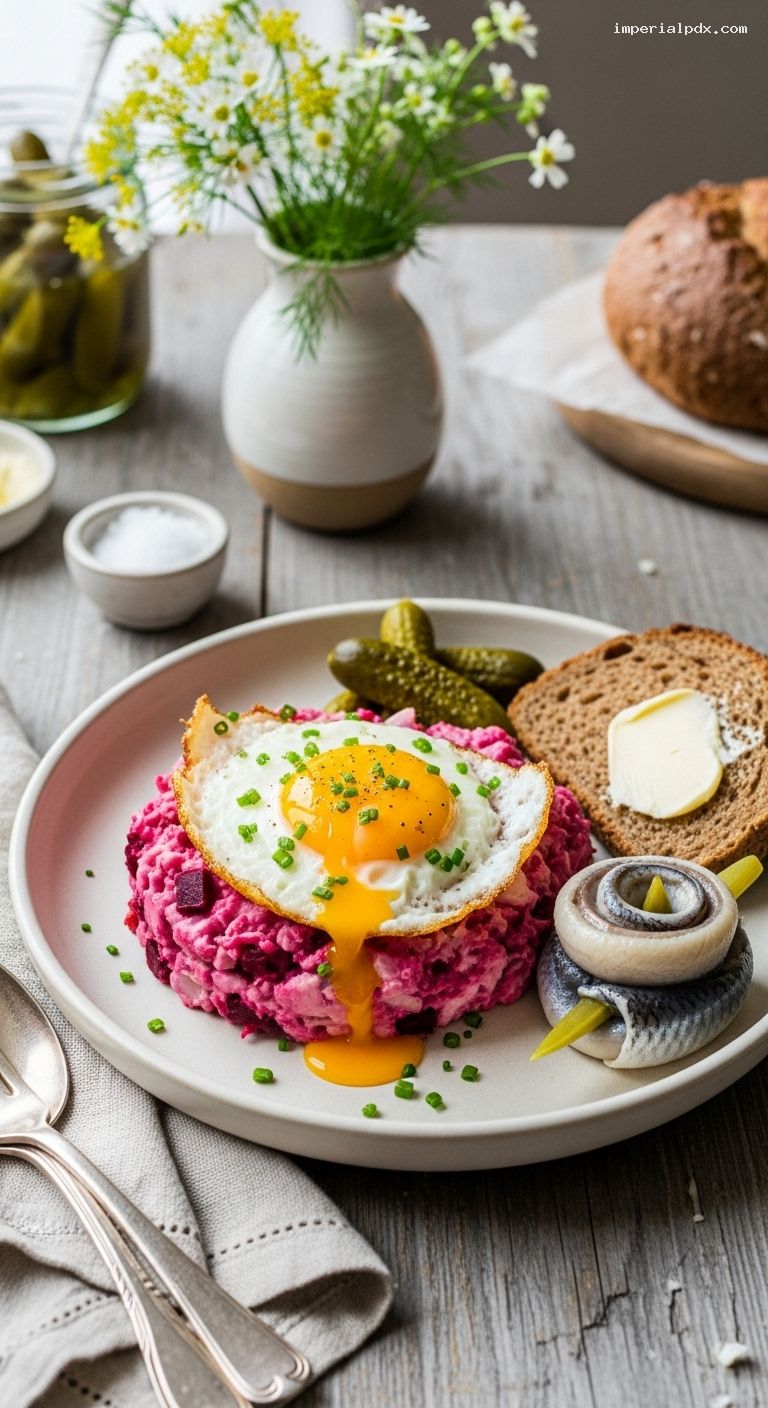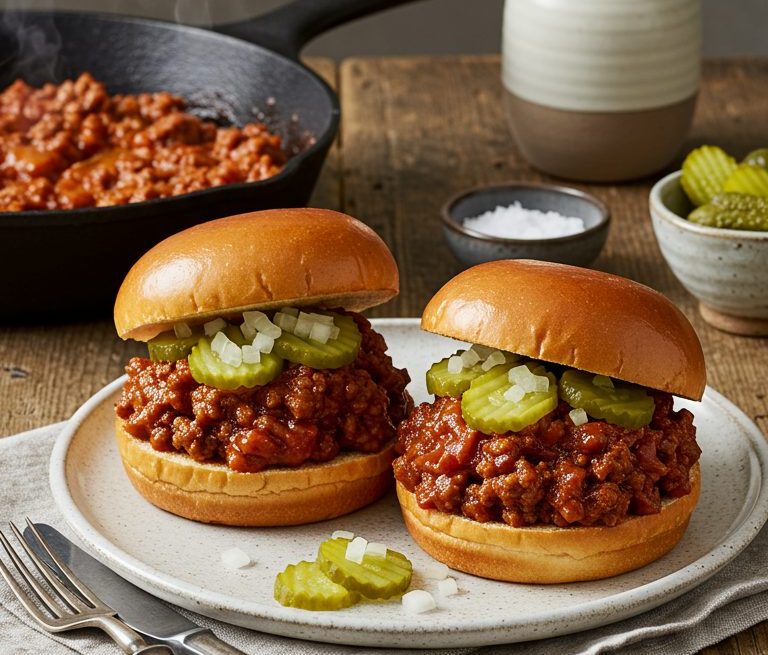Quick Recipe Version (TL;DR)
Quick Ingredients
- 2 lb (900 g) floury potatoes, peeled and cut into 1-inch chunks
- 1 large yellow onion, finely diced
- 12 oz (340 g) canned corned beef, crumbled
- 1 1/2 cups (250 g) cooked beetroot, finely diced + 1/4 cup (60 ml) beet liquid
- 1 cup (240 ml) hot low-sodium beef broth, plus more as needed
- 1–2 tbsp dill pickle brine (from the gherkin jar)
- 5 tbsp unsalted butter, divided
- 4 large eggs
- 4 rollmops (pickled herring)
- 8 small gherkins and 4 slices rye bread
- Bay leaf, kosher salt, black pepper
Do This
- 1. Boil potatoes in salted water with a bay leaf until tender, 15–18 minutes; drain and steam-dry 2 minutes.
- 2. Sauté onion in 2 tbsp butter until golden, 8–10 minutes; add corned beef and pepper; cook 3–4 minutes.
- 3. Add 3/4 cup hot broth and the potatoes; mash to a coarse, spoonable consistency; stir in 1 tbsp butter.
- 4. Fold in diced beets, beet liquid, and pickle brine; simmer 5 minutes, adjusting thickness with more broth; season.
- 5. Keep mash warm on low. In a nonstick skillet, fry eggs in 2 tbsp butter over medium heat until whites set, 2–3 minutes.
- 6. Plate mash; top each with a runny egg; add rollmops, gherkins, and rye bread; garnish with chopped chives or dill.
Why You’ll Love This Recipe
- Comforting, savory mash tinted rosy by beetroot with hearty corned beef and sweet onions.
- Classic North Sea sailor fare: simple ingredients, big flavor, satisfying textures.
- Balanced plate with tangy rollmops, crisp gherkins, and buttery rye bread.
- Great for make-ahead mash; just fry fresh eggs when it is time to serve.
Grocery List
- Produce: Potatoes, yellow onion, cooked beetroot (vacuum-packed or jarred), fresh chives or dill
- Dairy: Unsalted butter, eggs
- Pantry: Canned corned beef, low-sodium beef broth, bay leaf, black pepper, kosher salt, gherkins (with brine), rollmops, rye bread
Full Ingredients
For the Labskaus Mash
- 2 lb (900 g) floury potatoes (Yukon Gold or russet), peeled and cut into 1-inch chunks
- 1 1/2 tsp kosher salt (for the cooking water), plus more to taste
- 1 bay leaf
- 2 tbsp unsalted butter
- 1 large yellow onion, finely diced (about 1 cup)
- 12 oz (340 g) canned corned beef, crumbled
- 1 cup (240 ml) hot low-sodium beef broth, plus more as needed
- 1 tbsp unsalted butter (stirred into the mash)
- 1 1/2 cups (250 g) cooked beetroot, finely diced
- 1/4 cup (60 ml) beet liquid (from the beet package/jar)
- 1–2 tbsp dill pickle brine (from the gherkin jar), to taste
- 1/2 tsp freshly ground black pepper
- Pinch of ground allspice (optional)
For the Eggs
- 2 tbsp unsalted butter
- 4 large eggs
For Serving
- 4 rollmops (pickled herring fillets rolled with pickle)
- 8 small gherkins (or 4 large dill pickles, halved)
- 4 slices dense rye bread, lightly buttered (optional)
- 2 tbsp finely chopped chives or dill
Step-by-Step Instructions
Step 1: Prep and cook the potatoes
Place the potatoes in a medium pot, cover by 1–2 inches with cold water, add 1 1/2 tsp kosher salt and the bay leaf. Bring to a boil over high heat, then reduce to a gentle simmer and cook until a knife slides in easily, 15–18 minutes. Drain well, discard the bay leaf, return potatoes to the hot pot, and let steam-dry with the lid ajar for 2 minutes.
Step 2: Sauté onions and warm the corned beef
In a large sauté pan or Dutch oven over medium heat (about 350°F/175°C surface temperature), melt 2 tbsp butter. Add the diced onion and a pinch of salt; cook, stirring occasionally, until softened and golden at the edges, 8–10 minutes. Stir in the corned beef and black pepper (and allspice, if using). Cook 3–4 minutes, breaking up the meat until warmed through and lightly browned in spots.
Step 3: Build the mash base with broth
Pour in 3/4 cup of the hot beef broth and bring to a gentle simmer. Add the cooked potatoes to the pan and mash directly in the pan with a potato masher to a coarse, spoonable texture. Stir in 1 tbsp butter. If the mixture seems dry, add more hot broth a few tablespoons at a time.
Step 4: Tint and season with beets and brine
Fold in the diced beetroot. Add beet liquid a tablespoon at a time until the mash is a warm rosy pink (you may not need all 1/4 cup). Stir in 1–2 tbsp pickle brine for brightness. Simmer on low heat for 5 minutes, stirring occasionally, to marry flavors. Taste and adjust salt, pepper, and brine as needed.
Step 5: Keep warm and adjust texture
Reduce heat to the lowest setting and cover the pan to keep the Labskaus warm and moist. If it thickens while standing, loosen with a splash of hot broth and stir gently to keep a rustic texture.
Step 6: Fry sunny-side-up eggs
In a nonstick skillet over medium heat, melt 2 tbsp butter. Crack in the eggs and cook until whites are set with lacy edges and yolks still runny, 2–3 minutes. Lightly season with salt and pepper.
Step 7: Plate the Labskaus
Spoon a generous mound of the corned beef–potato–beet mash onto warm plates. Top each portion with a fried egg. Arrange a rollmops and a few gherkins on the side. Add a slice of rye bread and sprinkle chives or dill over the egg and mash. Serve immediately.
Pro Tips
- Steam-dry the potatoes so the mash absorbs flavors without turning watery.
- Add beet liquid gradually; aim for a gentle rose hue, not a bright fuchsia.
- Use hot broth when adjusting consistency to keep the mash silky and warm.
- Fry eggs in plenty of butter for crisp edges and rich flavor—classic with Labskaus.
- Warm plates help the mash stay supple and the egg yolk remain luxuriously runny.
Variations
- Hamburg Classic: Finely chop 1–2 pickled herring fillets and fold into the mash instead of serving rollmops on the side.
- Vegetarian Smoky: Swap corned beef for 12 oz (340 g) sautéed mixed mushrooms with 1 tsp smoked paprika and 1 tbsp soy sauce.
- Root Veg Twist: Replace 1/3 of the potatoes with celeriac or parsnip for an earthier, slightly sweeter mash.
Storage & Make-Ahead
The mash (without eggs) keeps well refrigerated in an airtight container for up to 3 days. Reheat gently over low heat with splashes of hot broth to restore a spoonable texture. Fried eggs and rollmops should be added at serving time. The mash can be frozen for up to 2 months; thaw overnight in the refrigerator and reheat with broth. Rye bread is best fresh; toast if day-old.
Nutrition (per serving)
Approximate: 675 kcal; Protein 27 g; Carbohydrates 58 g; Fat 37 g; Fiber 7 g; Sodium 1900 mg. Values will vary based on specific brands and brine amounts.



